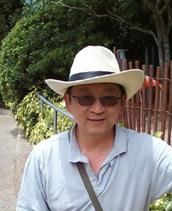


Biography: Dr. Cheng-fu Chen is a professor in the Department of Mechanical Engineering at the University of Alaska Fairbanks, Fairbanks, AK, USA. He received Ph.D. in Mechanical Engineering at the University of Wisconsin-Madison in 2000. Prior to joining UAF in Nov., 2002, he has been a Research Associate at UW-Madison since 2000, with a research focus on the prediction of photomasks distortions due to thermomechanical loading. He has been selected as an Air Force Summer Faculty Fellow in 2009, in the summer of 2013. He has more than 50 publications in various journals and conference proceedings. He is the founder of BhaisaPi Tech LLC, a high tech company dedicated to R&D and commercialization of devices for aerospace and biomedical applications.
Research Interest: His research interests span the fields of microfluidics, bioengineering, and thermomechanical aspects of electronic packaging. In microfluidics, he has partly dedicated himself to demonstrating the effectiveness of air plasma oxidization of the polydimethylsiloxane (PDMS), which is widely used in prototyping microfluidic designs. His research activities in microfluidics yield a pending patent application and a few publications about using droplet-based microfluidics for sampling. In bioengineering, his ongoing project (sponsored by NASA, USA) is on miniaturization of electrophoresis and fluorescence detection for detecting DNA damage to space radiation. His research in biomaterials is primarily on the application of fracture mechanics on evaluating the stress corrosion cracking of biodegradable magnesium alloys. He is also leading a group of students and faculty members to study stress corrosion cracking of nanoparticle-coated aluminum alloys. His interests in electronic packaging has been mainly on the application of solid mechanics in solving some thermomechanical issues in highly complicated and heterogeneous electronic devices. His work on equivalent modeling of thermomechanical properties of through-silicon-via interposers has been recognized by ITRI for facilitating commercialization of a software package for designing 3DIC integration.
Speech Title: Fracture Energy and Toughness of Air Plasma Oxidized PDMS-PDMS Bonding
Abstract: The fracture energy, toughness and failure modes of air plasma oxidized polydimethylsiloxane (PDMS) bonding is evaluated in this paper. A load-extension curve was recorded for each PDMS-PDMS bonded specimen which was subjected to T-peel testing at a constant-displacement rate from a slack status until being pulled-apart. From each curve we applied the linearly elastic fracture mechanics to determine the fracture energy (critical strain energy), which is the maximal strain energy a bonded specimen can hold without losing its structural integrity, and toughness (surface energy), which represents the bonding energy at the interface, for each specimen. A distribution of the calculated values against the air plasma treatment parameters shows the predominant range 0.1~0.4 N/mm for the fracture energy and 0.1~0.2 N/mm for toughness. Together with an analysis on three failure modes (cohesive, adhesive, and mixed) observed in this work, we found that a specimen with weak bonding was associated with a low fracture energy density. For weak bonding we suggest that 0.1 N/mm as a threshold value of the fracture energy, below which a specimen will be very likely to fail by de-bonding.
Keywords: air plasma, PDMS, bonding, fracture energy, toughness, failure modes